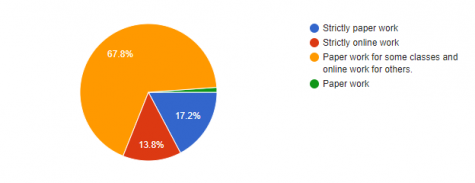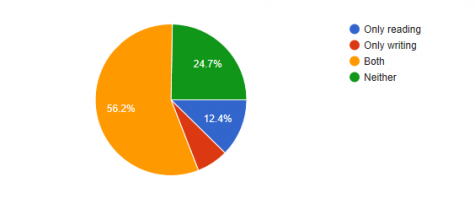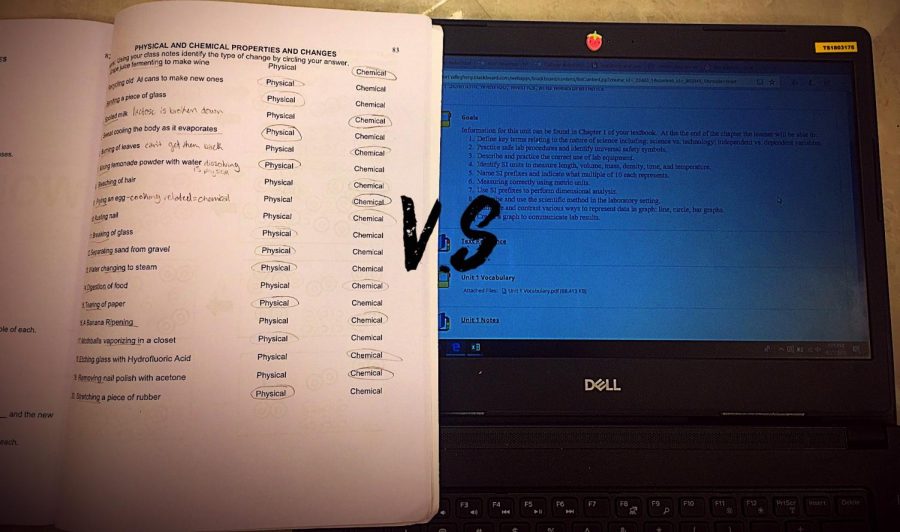College-Ruled Notebook or Google Docs?
It seems like technology is the answer to everything nowadays, but is it truly what’s best.
Old School vs. New School
As the 21st century continues on, so does our technological advances. More and more school work is done on a computer or an iPad. Less paperwork is being used by students. Is this a problem? What are the pros and cons of online and paperwork? Will skills once popular and common are lost? And how do the students themselves feel towards the growing use of technology in the classroom?
Up until the mid-1990s, all students knew was paper, paper, and more paper. An essay in English means its handwritten. Chemistry homework due tomorrow? Get the paper copy. With this came multiple pros and cons.
Pros included kids doing more work independently. There was no looking up answers online or texting a friend for work. Constant error messages and computer crashes that prevent us from completing our homework were nonexistent at that time.
Cons, however, include killing excessive amounts of trees to produce the paper and ultimately hurting the environment. Also, there was no fast research where the results of a search popped up immediately. Instead, students went to libraries to look over thousands of books to find their questions.
Many would argue that people, especially young people, are losing the ability to find a physical book and sit and read. The world that once was is constantly changing and evolving towards a more technology-based environment. The real question is, do the actual students prefer this newly, evolving world?
From a group of 87 students, 67.8% voted that they prefer paper copies for certain classes and online work for others. Very few students strictly prefer either option, but between the two, strictly paperwork was preferred by 3.4% more students than strictly online work with 17.2% of the 87 students preferring paper.

The students’ reasons for their preferences were very similar yet mixed. Each side had valid opinions on why they would rather one or the other. Multiple benefits and disadvantages were stated and evaluated.
Anna Hladio, who is in favor of paperwork, said, “To me, it seems that when we use paper, there are way less issues with the work being done. Tests on Blackboard don’t glitch out, homework doesn’t get lost on the internet, and there are no network problems. Also, after I use my laptop for a long time, my head starts to hurt and it makes it hard to sleep which worsens my performance at school overall.”
The majority of people who voted for paperwork stated that online work caused too many distractions. They believe they focus on the actual work more when it is physically in front of them.
Multiple students expressed how after using their computer they experience headaches and pain around their eyes. This was common amongst these students.
Blaise Husek, with an opposing preference, said, “I feel like using paper can be very wasteful. Most of the time, if a paper if very important, someone will take a picture of it. And it can be cleaner too, you’re not killing trees and you’re binder won’t be filled with 7 different packets.”
A major common argument presented by students who like using online work more is that it is better for the environment. Fewer trees are being chopped down to create paper and they support that. Online work is environment-friendly because all the work is in one place.
Some people also stated that having their work online helps them stay organized. Having numerous packets and worksheets is not something all people enjoy. Online files and folders are what some students say they prefer.
Lastly, there are students who prefer both options as a form of work. Andrew Hickerson, a student in favor of this, said, “I feel as if that we shouldn’t try and separate the two as both work well in conjunction with one another. Whether it be taking notes from a computer onto paper that may help you remember the topic better to typing up an essay in comic sans with notes from a book easy to acquire without any issues involving wifi or power. Both sides have their advantages and disadvantages.”
Many of these students state that both forms help them learn in different scenarios. They gain knowledge better using both in specific classes. Some say they remember things better when they write the information down, but they also enjoy typing up notes.
They also like the collaboration benefit online work gives students. For example, a Google doc allows multiple people to edit a document at the same time. The process of a project can be sped up this way because more work is being done at the same time.
With the subject of more and more technology use in schools today comes this question: Are people forgetting how to handwrite and possibly use cursive?
The main reason presented by the students who prefer both forms of work was what specific classes they like using each type of work in. This student said, “I prefer to have paperwork for math and sciences because it’s nice to be able to write out the problem in these subjects since it’s harder to do so on computers and such. History and English are digital for me because I don’t think you’ll write an essay on paper and walk it to your teacher or boss when you could type and send it digitally.”
This student was not alone with their statement about preferring to type in subjects like English when they construct essays. Countless students stated they would much rather type than write because it is easy or cleaner. Some even said that their handwriting is not legible enough to write in.
Out of 89 students, 24.7% voted they could neither read nor write in cursive. On a brighter note, 56.2% of the 89 students said they could do both when it comes to cursive.

Is the use of digital ways of writing affecting how many people can actually use this once-common technique? How long will it be before no one can sign their name? More and more young people are forgetting. Schools are not teaching or enforcing cursive as much as in past years. What does this mean?
Mr. Hull, an English and Journalism teacher at NAI, stated his opinion on the ability to write in today’s day in age. Hull said, “I know I’m probably in the minority with this, but I don’t really care if people can write in cursive. I think it is a skill of the past. Letter writing? Who really writes letters anymore? We need to know how to write for a different kind of audience. A more 21st-century audience. I don’t really know anyone who writes letters who go through the mail anymore, so we need to learn how to write for what our purposes are today. I’m not sure if that is as important as it once was.”
People may argue that cursive is a skill that should live on. But in today’s day in age, where would we use that skill except maybe to sign our name on important documents?
Mr. Hull also expressed his views on paper and online work as a teacher. Hull said, “I think that sometimes online can be better and I think sometimes paper is better, so I think it’s important that we evaluate when we’re talking about online. Like what is the ultimate purpose? If it’s just another way to memorize a bunch of pointless information, then we shouldn’t do that at all. So whether it’s technological or paper, we have to be thinking about what’s the purpose of using that specific tool.”
Mr. Hull also stated how, as a teacher, using tools like digital books helps his students and him. Hull said, “As an English teacher when you’re reading digitally, you can do really cool things like annotating the text, look up words easier, collaborate with other students. When you read a paper novel, it’s just you and the book.”
It seems as we continue into the 21st century, online work is truly becoming the popular option. Paper is used here and there but is lessening as the years go by. The world is evolving while the skills and techniques of the past are changing into a more futuristic version.

Anna is a sophomore at NAI this year. This is her first year writing for NAEye newspaper. Anna enjoys participating in the arts including theatre, painting,...

Mia Simmons is a sophomore at NAI this year. This is her first year in journalism and she is very excited about what is in store for the oncoming year....


